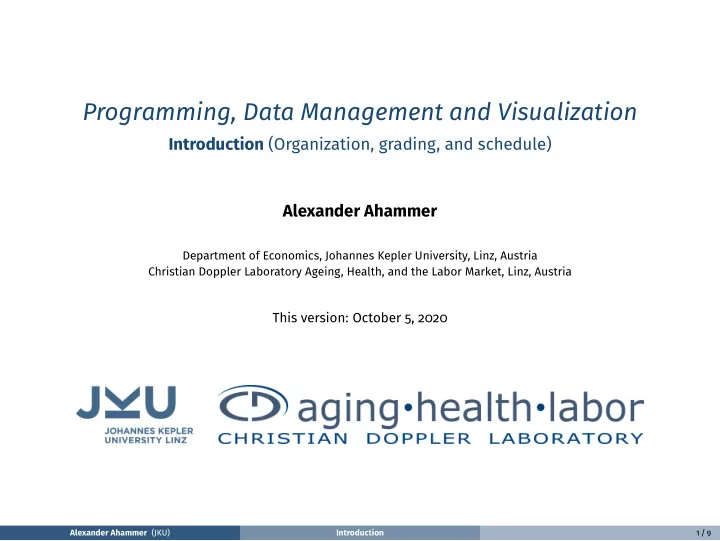

Programming, Data Management and Visualization Introduction (Organization, grading, and schedule) Alexander Ahammer Department of Economics, Johannes Kepler University, Linz, Austria Christian Doppler Laboratory Ageing, Health, and the Labor Market, Linz, Austria This version: October 5, 2020 Alexander Ahammer (JKU) Introduction 1 / 9
Purpose of the class All relevant material can be found on my website: www.alexander-ahammer.com/teaching In this class you will learn advanced concepts in programming and data management using Stata. Should serve as basis for other econometrics courses in the JKU curriculum, but also for work in the private sector. Will prepare you to write an empirical master thesis. A specific emphasis is placed on econometrics and big data. Alexander Ahammer (JKU) Introduction 2 / 9
Prerequisites Standard KS worth 4 ECTS. Ideally taken by first year MSc students, interested BSc and PhD students are highly welcome as well. Prior knowledge of econometrics and statistics at the level of Intermediate Econometrics is a must. It’s also required to know Stata at the same level ( ≈ Intermediate Econometrics IK ), although by investing time before the course you may catch up any non-existing knowledge (Stata has a steep learning curve). ◮ A 6-month student license for Stata costs $35. Curriculum change For all students who took at least one course in the module ‘Methods in Economics’ before October 1, 2018 this course is not compulsory. For all others it is. Alexander Ahammer (JKU) Introduction 3 / 9
Topics Module A: Elementary concepts and data organization ◮ How to set up and organize a project, replicability, data types, memory, importing and exporting data. Module B: Programming preliminaries ◮ Writing do-files efficiently using lists, logical qualifiers, strings, observation numbering; functions, macros, scalars, and matrices; loops. Module C: Data management ◮ Data validation; reorganizing and combining datasets, useful data management commands. Module D: Reporting results ◮ Store, save, and reuse computed results; automate graphs and tables, producing publication-ready tables with Stata. Module E: Data analysis and visualization ◮ Summary statistics, cross-tabulations, graphs, geographical maps. Alexander Ahammer (JKU) Introduction 4 / 9
What this course is not A general course in programming ◮ We don’t have time to cover basics in algorithms, execution and iterative solutions, arrays and matrices, and so on ◮ Focus on statistical programming, application-centered A course in R or Python ◮ All subsequent courses use Stata, so the course is tailored to that ◮ Most concepts apply also to other languages ◮ Stata is not object-based, but rather procedural or function-based ◮ Stata is user-friendly, that’s why we don’t need many basics from the point above Alexander Ahammer (JKU) Introduction 5 / 9
Organization and grading Weekly lectures, please go through slides before each lecture (try exercises and google concepts that may be unclear to optimally prepare for the course). Bi-weekly problem sets (5 à 6 points = 30 points) ◮ Typically very short exercises aimed at applying methods we covered in class. ◮ Published after our meeting, link in syllabus. ◮ Send commented do-file in via mail to me, observe file name and mail subject. ◮ Following week we go through the PS in class. Take-home exam (30 points) ◮ To be solved during semester holidays, based on all the contents we learned during the semester. ◮ More information in the syllabus. Check the Syllabus (to be updated regularly) Alexander Ahammer (JKU) Introduction 6 / 9
Grading scheme from to Grade 0 30 5 (Nicht Genügend) 31 37 4 (Genügend) 38 45 3 (Befriedigend) 46 53 2 (Gut) 54 60 1 (Sehr Gut) Alexander Ahammer (JKU) Introduction 7 / 9
Literature Main material is my slide set. Structure is loosely based on Baum (2009) ◮ Christopher F. Baum (2009), ‘An Introduction to Stata Programming,’ first or second edition, Stata Press, College Station, Texas. Great Stata tutorials: ◮ Germán Rodríguez (Princeton) [Link] ◮ Social Science Computer Cooperative (SSCC) [Link] ◮ IDRE (UCLA) [Link] ◮ Stata blog: Programming an estimation command [Link] Learn to use Google and the built-in Stata help for problem solving! Alexander Ahammer (JKU) Introduction 8 / 9
Contact I don’t offer regular office hours, please email me if you require an appointment: ◮ alexander.ahammer@jku.at Alexander Ahammer (JKU) Introduction 9 / 9
Recommend
More recommend